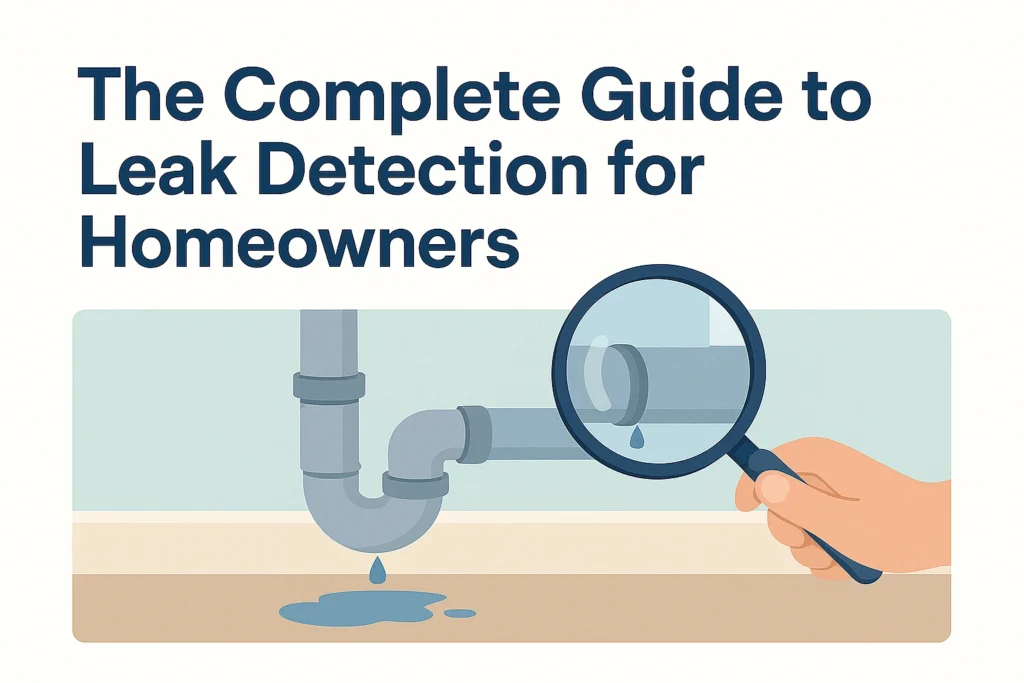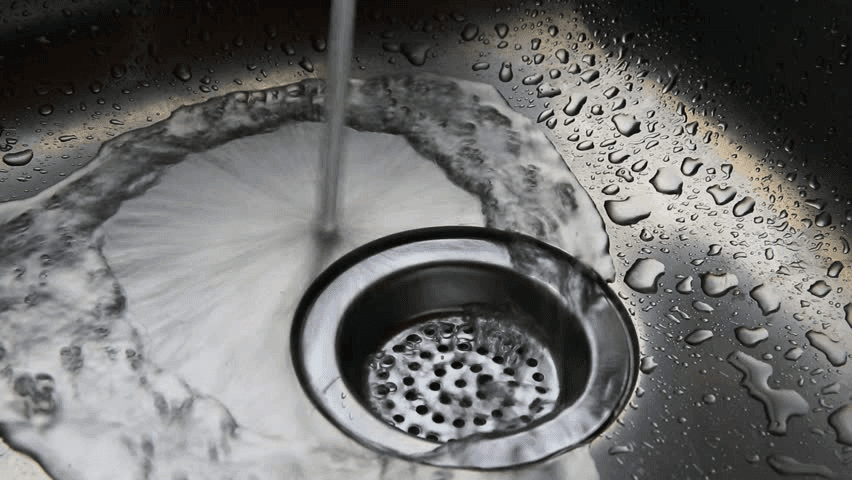Water leaks often appear harmless, but if left unchecked, they can cause serious problems in your home. Hidden plumbing leaks can quietly drive up your water costs, weaken your home’s structure, and create conditions for mold to spread. This guide on leak detection for homeowners will explain how to spot leaks, the tools and methods you can use, and when it’s best to bring in professionals. We’ll also cover insurance considerations and practical ways to prevent future leaks. Whether you’re a new homeowner or simply want to protect your property, this resource offers everything you need for effective home water leak detection.
Why Water Leak Detection Matters for Homeowners
Water leaks don’t just waste water, they affect your health, safety, and finances. One of the biggest risks with hidden leaks is that they remain unnoticed until major damage is already done.
- Higher Bills: Even a minor drip can waste hundreds of gallons each month, showing up as an unexplained spike in your water bill.
- Structural Damage: Over time, leaks weaken wood, drywall, and flooring, leading to costly reconstruction.
- Health Concerns: Dampness encourages mold, which can worsen allergies and respiratory conditions.
- Insurance Issues: Many home insurance water damage policies only cover sudden leaks, not long-term ones caused by neglect.
Staying alert to the signs of water leaks in your house is one of the most important steps toward long-term water damage prevention.
Common Signs of Water Leaks in Your Home
Catching leaks early can save thousands in repairs. Here are some of the most common signals that help with detecting hidden water leaks:
Rising Water Bills and Meter Changes
If your bill rises unexpectedly without any change in usage, you may have a hidden leak. A quick test is to shut off all taps and check your water meter if it continues to move, water is escaping somewhere.
Damp Walls, Stains, and Musty Odors
Yellow stains, peeling wallpaper, or bubbling paint usually indicate water trapped inside the walls. A damp, musty odor is often a strong sign that mold has already started developing.
Sounds of Running Water or Hissing Pipes
Hearing running water or hissing noises when no taps are on often points to leaks in hidden plumbing lines.
Warm Floors, Mold Growth, and Pest Infestations
Warm spots on floors can suggest a slab leak in hot water pipes. Moisture also attracts termites and other pests that thrive in damp environments.
DIY Leak Detection Methods Every Homeowner Should Know
Not every leak needs professional tools to detect. These DIY water leak detection tips can help you catch problems before they escalate.
Step-by-Step Water Meter Leak Test
- Shut off all indoor and outdoor water sources.
- Write down your meter reading.
- Wait one to two hours without using water.
- If the reading changes, a leak is present.
This simple water meter leak test is one of the easiest ways to confirm hidden leaks.
Toilet Dye Test for Silent Leaks
Toilets are among the biggest water wasters. Add a few drops of dye to the toilet tank and check back after about 10 minutes. If you notice the dye seeping into the toilet bowl, it means the flapper isn’t sealing properly and water is escaping. This toilet leak detection trick can save hundreds of gallons monthly.
Faucet, Shower, and Appliance Leak Checks
Check sinks, showers, washing machines, dishwashers, and refrigerators. Inspect around fittings and shut-off valves for signs like moisture, rust buildup, or slow drips.
Inspecting Irrigation and Outdoor Plumbing Systems
Broken sprinkler heads or soggy areas in your yard often point to leaks in outdoor systems. Regularly inspecting these helps avoid wasted water and landscaping damage.
Advanced Leak Detection Technologies and Tools
Some leaks are too well hidden for DIY checks. Professionals use advanced equipment like acoustic leak detection and thermal imaging leak detection to locate them with precision.
Acoustic & Ultrasonic Leak Detection Explained
Sensitive microphones pick up the sound of water escaping pipes. Ultrasonic devices detect even the smallest leaks at frequencies beyond human hearing.
Thermal Imaging Cameras and Moisture Meters
Infrared cameras reveal temperature changes caused by leaks, while a moisture meter for leaks confirms dampness levels in walls, ceilings, and floors.
Tracer Gas Leak Detection for Hidden Pipes
Non-toxic gases such as hydrogen are introduced into pipes. If the gas escapes, detectors can identify the exact leak location without tearing through walls.
Smoke Testing for Sewer & Drain Leaks
For sewer systems, smoke is blown into pipes. If smoke appears indoors, there’s a crack or opening in the line.
Special Types of Leaks and How to Detect Them
Some leaks are particularly challenging to identify. Here are common examples:
Detecting Slab Leaks Under Concrete Floors
A slab leak develops beneath your home’s concrete foundation, making it harder to detect. Signs include hot or cold floor spots, cracks in the flooring, or sudden drops in water pressure. Professional slab leak detection is usually needed here.
Roof and Ceiling Leak Signs
Water stains on ceilings or drips during rainfall often point to roof leaks. Since water can travel before it shows, pinpointing the source requires careful inspection.
Outdoor Yard and Irrigation System Leaks
Burst irrigation lines can lead to uneven grass growth and swampy patches in the yard. A professional irrigation system leak detection check prevents unnecessary digging.
When to Call Professional Leak Detection Services
DIY methods can only go so far. For stubborn leaks, professional leak detection services are the safest option.
Benefits of Hiring a Leak Detection Specialist
- Accurate detection reduces unnecessary damage.
- The quicker the issue is found, the less water is wasted, and the lower your repair expenses will be.
- Non-invasive tools prevent needless wall or floor removal.
Average Leak Detection and Repair Costs
Leak detection usually costs between $150–$500. Repair expenses vary widely from minor pipe fixes to major slab rerouting jobs.
Emergency Leak Detection and Repair
For severe leaks or flooding, shut off your main supply immediately and call a professional. If you’re in Ontario, a reliable plumber in Toronto, Brampton, Mississauga, or Markham can provide urgent help with plumbing.
Insurance and Cost Considerations for Leak Repairs
Leaks often come with financial stress. Knowing your coverage and options can help:
- Coverage Limits: Policies generally cover sudden water damage but exclude gradual leaks from poor maintenance.
- Utility Adjustments: Some providers reduce your bill if you submit proof of a repaired leak.
- Choosing the Right Experts: Hiring the best leak detection company ensures accurate assessments and fair pricing.
Preventing Water Leaks in the Future
Regular maintenance is almost always more affordable than dealing with sudden plumbing emergencies. Here’s how to prevent water leaks at home:
Seasonal Home Maintenance Checklist
- Inspect faucets, pipes, and toilets every few months.
- Clean gutters and inspect the roof after storms.
- Look behind appliances for hidden drips.
Replacing Supply Lines and Fixtures
Replace brittle hoses on washing machines, dishwashers, and refrigerators every 5–7 years to reduce risk.
Smart Leak Detection Devices and Shutoff Valves
Install smart sensors that send alerts to your phone. Some advanced models can automatically shut off your water supply when leaks are detected.
FAQs on Home Leak Detection
How do I check for hidden water leaks?
Begin by running a water meter test: shut off every faucet and appliance, then check if the meter needle still moves. You can also use dye for toilets and check under sinks and appliances.
Are slab leaks covered by insurance?
Most policies cover sudden water damage but exclude slow leaks that develop over time. Always review your policy details.
Can thermal cameras really find leaks?
Yes. Thermal cameras don’t detect water directly, but they reveal temperature differences that indicate hidden moisture problems.
Conclusion – Take Control of Water Leaks Before They Spread
Water leaks may begin small, but their impact can be huge. By recognizing the signs of water leaks in your house, trying simple DIY tests, and reaching out to professionals when needed, you can avoid costly repairs and protect your health. Don’t wait until the damage worsens. Schedule routine checks, invest in preventive tools, and call a trusted plumber in Toronto, Brampton, Mississauga, or Markham for expert plumbing services when necessary. Protecting your home now ensures peace of mind for years to come.




